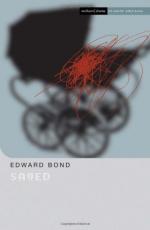|
This section contains 431 words (approx. 2 pages at 400 words per page) |

|
Saved Summary & Study Guide Description
Saved Summary & Study Guide includes comprehensive information and analysis to help you understand the book. This study guide contains the following sections:
This detailed literature summary also contains Bibliography on Saved by Edward Bond.
Saved was first presented on November 3, 1965, at the Royal Court Theatre, London, as a private club production of the English Stage Society. The "club" designation was necessary because the Lord Chamberlain, the head of the Queen's household and the official censor of British theatre, had demanded such substantial alterations to the text before granting a license for performance that the Royal Court had decided to dodge the law in order to present the play as written and without a license. It had long been held that the Lord Chamberlain did not have authority over "private" club productions.
The production caused an uproar. On opening night there were shouts of outrage from the audience and physical violence in the foyers during the intermission and after the show. Saved explores the dehumanizing industrial environment and the moral emptiness of the working-class world of South London and the beastliness and brutality that are the result. The scene that most shocked the audience and to which the Lord Chamberlain had objected with no room for compromise involved the murder of a bastard baby in its pram by a group of young working-class louts, including its father. Most of the critics, with such prominent exceptions as Martin Esslin, Penelope Gilliatt, and Alan Brien, "slaughtered" the play. Aroused patrons formed "representative" organizations to fight such "obscene," "sadistic," "filthy," and "unfunny" drama. Leaders of the Royal Court were arrested on a technicality of the law (police officers, who were members of the English Stage Company, were not required to show their cards when entering the theatre) and there was a court case.
Although the Lord Chamberlain made it clear that he did not intend to challenge the right of private clubs to present plays that had not been approved by his office, the Magistrate's decision stated clearly that the Lord Chamberlain did in fact have jurisdiction over such productions. That closed the door on what had always been seen as an outlet for avant garde theatre to be performed free of censorship. The Saved case was thus directly instrumental in ending pre-production censorship in England, which officially occurred on September 28, 1968. (Early Morning, Bond's next play, was the last play to be banned in toto by the Lord Chamberlain.) One of the first results of the demise of the censor was a short repertory season of Bond plays at the Royal Court Saved, Narrow Road to the Deep North, and Early Morning. The abolition of the censor by the Theatres Act of 1968 allowed the whole of theatre to deal seriously with contemporary reality in an adult manner.
Read more from the Study Guide
|
This section contains 431 words (approx. 2 pages at 400 words per page) |

|



